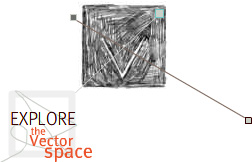Programmed Visions
Design by Raegan Kelly
Author's Statement
"Race has become metaphorical-a way of referring to and disguising forces, events, classes, and expressions of social decay and economic division far more threatening to the body politic than biological "race" ever was. Expensively kept, economically unsound, a spurious and useless political asset in election campaigns, racism is as healthy today as it was during the Enlightenment. It seems that it has a utility far beyond economy, beyond the sequestering of classes from one another, and has assumed a metaphorical life so completely embedded in daily discourse that it is perhaps more necessary and more on display than ever before."
--Toni Morrison
This project grapples with the paradox Toni Morrison so eloquently articulates: the discrediting of race as a biological category has not led to the end of race or raced images, but rather to their proliferation. To explain this phenomenon, it examines what work "knowing race" does--how the drive to "know race" is intertwined with the very truth mechanisms of visual media and technologies, the logic of genetics, and the banal everyday actions of our governments. Building an archive of diverse texts (from early 20th century American eugenics textbooks to Toni Morrison's _The Bluest Eye_, from late 19th century British texts on fingerprinting to the UNESCO statements on race), it argues that what is important about controversies over the meaning of race is not: is race biological or cultural, as if the terms "biological" or "cultural" were themselves static. More importantly, the terms "biological" and "cultural" rely on race for their very meaning, for modern racial discourses define and negotiate the relationship between the social, the scientific, the legal and the cultural. Dissension over the nature of race does not defuse the importance of race, but rather bears testimony to the work race does.
"Programmed Visions" stems from a larger book project of the same title that traces the surprising resonances between software and race as forms (or alleged forms) of archival knowledge. This book investigates race and software as visualizations of supposedly transmissible, trackable, yet invisible technological, biological or cultural sources--software, dna, race as ahistorical programmed histories. Race in science, for instance, has not disappeared but is now re-surging in molecular biology as mutations in mostly unexpressed genetic material, as a way to establish ancestry—linear, forensic relation. This project wagers that that race and software maintain visual knowledge in an age of waning indexicality--they precipitate what I call a frenzy of and a decline in visual knowledge. Thus in content and in form, "Programmed Visions" plays with the idea: the less we know--the less we are certain of--the more we are shown in an attempt to wed the visual into a causal relationship with the invisible. Rather than simply being a visualization of a theoretical argument, this project seeks to trouble the relationship between visualization and theory, and a major goal of this project is to interrogate the visual and mathematical metaphors that dominate Michel Foucault's work on archives.
The final form of this project stems from many weekly conversations between Raegan Kelly and myself. Working from the texts, we gradually developed a structure--a complex volume--which we felt began to address the concept "race as archive." Playing with the structure, we wanted to make clear the resonances between the technical aspects of this project (database, code etc.) and its content: race as a form of programmability.



